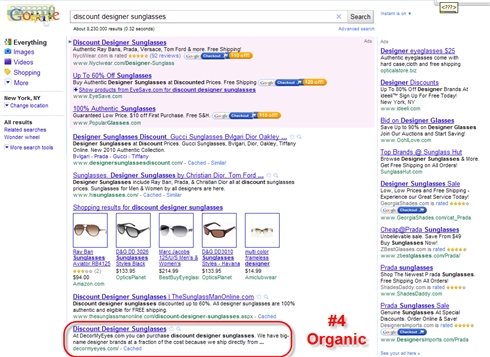 Look how old this is!
Look how old this is! I post at SearchCommander.com now, and this post was published 14 years 4 months 4 days ago. This industry changes FAST, so blindly following the advice here *may not* be a good idea! If you're at all unsure, feel free to hit me up on Twitter and ask.
Last night someone I ran into from my PCC internet marketing class told me about an article in the New York Times this Sunday, concerning a merchant who had seen an increase in his business since he started treating his customers poorly.
The eight page story that came out over the weekend is definitely worth a read, and quite thought provoking.
The guy at DecorMyEyes admits they treat customers like crap, and they have been accused of fraudulently charging credit cards, not shipping people at all, and even phoning customers and e-mailing threats. Not only does this guy not deny it, but he claims it’s helped his business!
The article actually claims that “He might also be a pioneer of a new brand of anti-salesmanship” — but don’t they remember the Soup Nazi? Far more important than these morons choice of consumer buzz generation is their claim that it has helped their search rankings too, presumably because of all the links they get!
It’s all part of a sales strategy, he said. Online chatter about DecorMyEyes, even furious online chatter, pushed the site higher in Google search results, which led to greater sales. He closed with a sardonic expression of gratitude: “I never had the amount of traffic I have now since my 1st complaint. I am in heaven.”
To me, the owner of Decor My Eyes sounds downright despicable, but his claims of negative reviews helping his search visibility can’t be ignored, and Google responded today in a way it seems to me to be a bit contradictory.
They wrote about it on their blog and they listed some possible “solution scenarios”, for which I’d actually like to see the last one put in place. However, then they announced a “solution”!
Yet another option is to expose user reviews and ratings for various merchants alongside their results. Though still on the table, this would not demote poor quality merchants in our results and could still lead users to their websites.
Google is also quick to point out this, which is important –
“…if we demoted web pages that have negative comments against them, you might not be able to find information about many elected officials, not to mention a lot of important but controversial concepts.
but then they immediately go on with their announcement of an actual algorithm change that’s a “…solution to this issue” ?!?
…”in the last few days we developed an algorithmic solution which detects the merchant from the Times article along with hundreds of other merchants that, in our opinion, provide an extremely poor user experience.
The algorithm we incorporated into our search rankings represents an initial solution to this issue, and Google users are now getting a better experience as a result.
Huh?
Are bad reviews actually going to lower rankings? Is that in place now? Will another cottage industry erupt for hurting your competition with fake reviews? Was Quince from Peak Studios a trailblazer?
Hardly. SEO sabotage is nothing new but who knows?
But I still see that DecorMyEyes seems ranks #4 organically for “discount designer sunglasses” so how exactly are users getting a better experience?

Certainly Google has been warning people of potential “threat” before they visit a website for years now, so Google should be able to notify users that the merchant is an out and out scammer, shouldn’t they?
How long do you think it will be before ecommerce sites, or all websites for that matter, have some sort of user rating score displayed in the SERPs? (And how long after that will the first crappy product come out to exploit it?)




















These are great thoughts, Scott. I especially like the idea of Google displaying warnings prior to entry on sites with questionable business history.
In some respects, this does more service to people than merely changing the algorithm to bump a company down, like DME. People don’t realize a company’s ranking is due to a systematic devaluation because of actual business quality unless they’re told up-front about it.
Hi Scott – sorry for the delay, but this comment got spamflagged – not sure why!
Yep, I do I think we’ll see star ratings soon…